Ryan Hall's Blog, page 203
November 6, 2016
Top 20 Finishers at the 2016 New York City Marathon
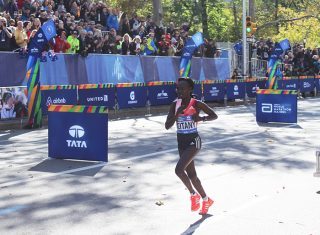
Mary Keitany approaches the finish line en route to her third straight New York City Marathon victory on Sunday. Photo: Brian Metzler
Here are the top 20 men and women finishers from the 2016 New York City Marathon.
RELATED: Keitany Threepeats, Youngster Ghebreslassie Win NYC Marathon Titles
Men
1. Ghirman Ghebreslassie (Eritrea) 2:07:51
2. Lucas Rotich (Kenya) 2:08:53
3. Abdi Abdirahman (U.S.) 2:11:23
4. Hiroyuki Yamamoto (Japan) 2:11:49
5. Shadrack Biwott (U.S.) 2:12:01
6. Tadesse Yae Dabi (Ethiopia) 2:13:06
7. Moses Kipsiro (Uganda) 2:14:18
8. Tyler Pennel (U.S.) 2:15:09
9. Ben Payne (U.S.) 2:15:46
10. Patrick Smyth (U.S.) 2:16:34
11. Craig Leon (U.S.) 2:17:14
12. Musa Babo Ido (Ethiopia) 2:17:57
13. Christo Landry (U.S.) 2:19:14
14. Brendan Martin (U.S.) 2:19:34
15. Senbeto Geneti Guteta (Ethiopia) 2:20:01
16. Mariano Mastromarino (Argentina) 2:20:08
17. Matthew Llano (U.S.) 2:20:15
18. Werkuneh Seyoum Aboye (Ethiopia) 2:20:54
19. Tim Ritchie (U.S.) 2:21:09
20. Harbert Okuti (Uganda) 2:21:27
RELATED: Young at Heart, American Adbirahman Places 3rd in NYC Marathon at 39
RELATED: Olympic Tri Champ Gwen Jorgensen 14th at 2016 NYC Marathon
Women
1. Mary Keitany (Kenya) 2:24:26
2. Sally Kipyego (Kenya) 2:28:01
3. Molly Huddle (U.S.) 2:28:13
4. Joyce Chepkirui (Kenya) 2:29:08
5. Diane Nukuri (Burundi) 2:33:04
6. Aselefech Mergia (Ethiopia) 2:33:28
7. Lanni Merchant (Canada) 2:33:50
8. Neely Gracey (U.S.) 2:34:55
9. Sara Hall (U.S.) 2:36:12
10. Ayantu Dakebo Hailemaryam (Ethiopia) 2:37:07
11. Esther Atkins (U.S.) 2:37:11
12. Dot McMahan (U.S.) 2:38:46
13. Kelly Arias (Columbia) 2:39:14
14. Gwen Jorgensen (U.S.) 2:41:01
15. Laura Manninen (Finland) 2:41:08
16. Kim Conley (U.S.) 2:41:38
17. Emma Nording (Sweden) 2:45:22
18. Hilary Dionne (U.S.) 2:45:31
19. Janet Bawcom (U.S.) 2:48:13
20. Dawn Grunagle (U.S.) 2:49:37
The post Top 20 Finishers at the 2016 New York City Marathon appeared first on Competitor.com.
Inside the Wheelchair Races at the NYC Marathon
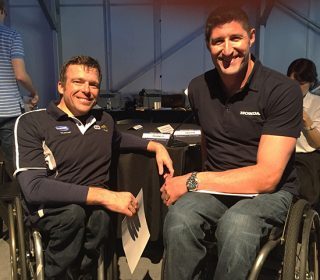
An hour before the elite women cross the starting line for their 26.2-mile journey around the five boroughs, an even speedier group—in fact, the fastest competitors in the race—will begin their division of the TCS New York City Marathon.
They’re the elite push rim wheelchair athletes, and while they’ve achieved more publicity and respect in recent years, especially thanks to the New York Road Runners support via appearance fees and larger prize purses as well as the inauguration of a wheelchair World Marathon Majors series competition, they remain something of a footnote in the coverage of the race.
That’s somewhat odd, since unlike the elite runners, who seem to be a pack of relatively faceless Africans who rotate over the course of a few years, the pro wheelers have distinct, and often humorous, personalities, and remain in the sport for a longer time, enough that they should be able to build up a following among fans of the sport.
Four time NYCM winner Kurt Fearnley is 35, and Ernst van Dyk is the Peyton Manning of his sport, still going strong at 43.
“We have the privilege of having an extended career,” said van Dyk. “If you look at why runners retire it’s usually because either their Achilles or their knee or their hip goes. We’re already in chairs. So none of that’s going to go. We have shoulder problems, wrist problems, elbow problems, but I think because there’s no impact—we don’t carry our own weight. We don’t pound it onto the road the whole time.”
Also, most elite wheelers don’t hit their marathon potential until relatively late in life, since theirs is a more technical sport than running. “It takes such a long time to get to our level,” Fearnley said. “You don’t see many people before their 30s reaching the pinnacle of marathons. You just don’t. So once you’re there, it’s just a matter of maintaining a certain level of strength and skill with the chair.”
“It takes a lot of years to find the right position, to find the right technique, and then to build up your endurance to do a marathon and sprint the last 400 meters on the track,” added van Dyk. “It’s a lot of things that needs to go right in an athlete’s career to reach that point of achievement.”
“Although our guys hang on, there’s a price that we’ll have to pay for it,” said Fearnley. “I can’t see myself lasting too many more years at this level because it is taxing.”
Although Fearnley (five NYCM wins, including a CR 1:29:22 in 2006) and van Dyk (two wins, including last year’s one-second victory) have had success over the course van Dyk compared to a 12-round heavyweight fight, on Sunday they’ll have to contend with a racer who has been unbeatable this year, Switzerland’s Marcel Dubbed the “Silver Bullet” for his speed as well as his chromed racing helmet, Hug has won every Major this year as well as the Rio Paralympics gold in the marathon, so this is the last chance for the rest of the men to break his stranglehold on the sport.
“We need him to lose a race,” said Fearnley. “He’s racing amazing. We haven’t had a guy win more than one race in a year for four years, and now he’s won what, five? He’s hitting his pace, and when you get momentum like that, sometimes you’ve just got to ride it out.”
“He’s got the ability to do a 400 meter up to the marathon at the same speed,” added van Dyk.
“I would have said hills were his weakness, last year we were able to break him on the bridges, but this spring in Boston he climbed so well,” said Fearnley. “He’s maturing and improving his all around capabilities,” van Dyk continued. Every race he’s won this year has been in the sprint, so he’s got a really good kick and that’s the weakness we have improve on. To beat him we have to be better in the sprint. A lot of that is finding the right time and place to go, and a lot of that is experience, that’s why it takes so long to master. The last three times I was second here I started my sprint too soon, and I’m very experienced. Last year I got it right and I won. It’s a very fine balance knowing when to go, especially with this finish being what it is.”
With Hug being the wheelchair equivalent of cycling’s superman Chris Froome, he’ll have an equally large bullseye on his back when the wheelers line up in Staten Island an hour before the elite women. They’ll finish before the women reach halfway, and if you like the intrigue and excitement of some of the Tour de France sprint finishes, this one should be a spicy appetizer to the elite runners’ races that follow.
The post Inside the Wheelchair Races at the NYC Marathon appeared first on Competitor.com.
November 5, 2016
Behind the Scenes of the the NYC Marathon Timing Operations
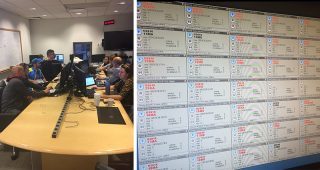
At left, New York City Marathon timing and scoring staff work on Saturday in the operations center, located more than half a mile from the physical finish line. At right, a computer monitor shows readouts from some of the 54 timing points on the marathon course. Photos: Jim Gerweck
Most runners, and even some highly placed race officials, think timing and scoring a running event, even one as big as the TCS New York City Marathon, entails little more than pushing a button or two and waiting for the results to print out or be posted online. Tom Kelley, who’s in charge of that function for the marathon and the dozens of other New York Road Runners races during the year, knows there’s just a bit more to it than that.
While the advent of transponder timing (colloquially known as “chip” timing) has made the process less hands-on, labor-intensive, the technology that enabled that has kept evolving at an almost exponential rate. Coupled with the growing fields of the marathon (some 50,000 runners will cover the five-borough course on Sunday) and the ever-increasing expectations of those following their family members and friends at home, it has made the task as involved as one of the old space shuttle launches.
Consider this: Kelley’s army of timers (including many from 15 outside timing companies as well as NYRR staff) will record runners passing over the start and finish lines, as well as every mile and 5K split en route, plus the halfway point. In addition, they’ll be tracked when they board buses or ferries early in the morning on their way to the start in Staten Island and when they enter the Athletes Village there, as well as when they exit Central Park after collecting their finishers medal and drop bags.
“It’s all a way of keeping track of how many people are in what stage of the race,” Kelley said from the timing and scoring control center, located in the NYRR headquarters more than half a mile from the finish line at Tavern on the Green. In total, there are 54 timing points, and almost all of them have two tag readers, or controllers.
These machines, about the size of a small microwave, all have to be synchronized, distributed along the course, then connected wirelessly to the scoring servers, which themselves have redundant backups, then fed into NYRR’s proprietary scoring software and posted online (fortunately, the days of printed results are long gone from races like New York, which would require two reams of paper for just a single set.)
In the early days of transponder timing, just the start and finish reads were recorded, but just like everything else in life, more data is always demanded. That’s become especially so with the advent of apps that allow tracking of runners: in order to make the progress reports as close to real-time as possible, lots of closely spaced data points are necessary.
The first attempts in this endeavor were hampered when the cellular networks became overwhelmed by all the people on the course following runners on their phones.
“Fortunately the wireless companies have really beefed up their networks and increased their capacity over that past few years,” Kelley said. “They’re less likely to be surprised by the demand on race day now.”
Still, the race for more data shows no signs of slowing down. This year, a dozen runners including some elites, some wheelchair racers as well as mid-packers, will be wearing a device that monitors biometric markers such as heart and breathing rate, body temperature and stride cadence and feeds that information back to the broadcast center.
How long will it be before all 50,000 runners in the marathon will be outfitted with similar devices? Given the progress in technology, sooner than you think. Tom Kelley and his team will be ready.
The post Behind the Scenes of the the NYC Marathon Timing Operations appeared first on Competitor.com.
Photos: Runners Rock Savannah
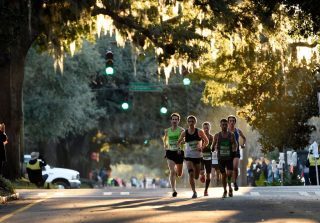
The Rock ‘n’ Roll Savannah Marathon & 1/2 Marathon took place on Saturday morning with picture perfect fall running conditions. Participants experienced a revamped route featuring Savannah’s charming town squares, historic buildings and canopies of Spanish moss covered trees. In true Rock ‘n’ Roll fashion, live bands, enthusiastic cheerleaders and spectators will line the race route, concluding with a celebratory finish line festival where Old Crowe Medicine Show headlined the Toyota Rock ‘n’ Roll Concert Series at Forsyth Park. (Photo Credit: Sanford Meyers)
Photo Gallery
1 of {count}
Back to Start
View Larger Image
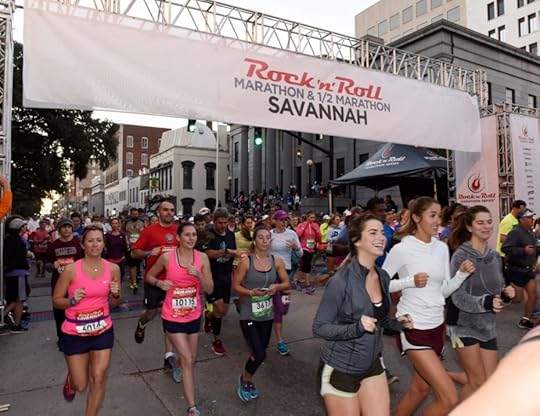
2016 Rock 'n' Roll Savannah Marathon & 1/2 Marathon
View Larger Image
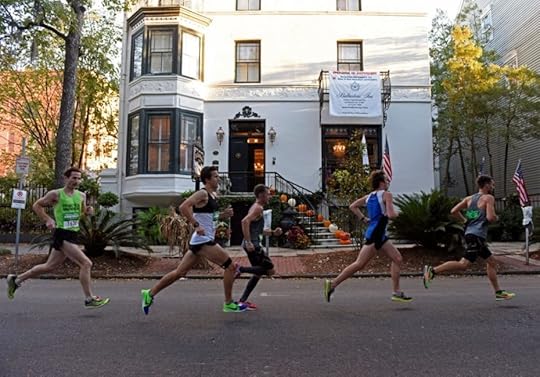
2016 Rock 'n' Roll Savannah Marathon & 1/2 Marathon
View Larger Image
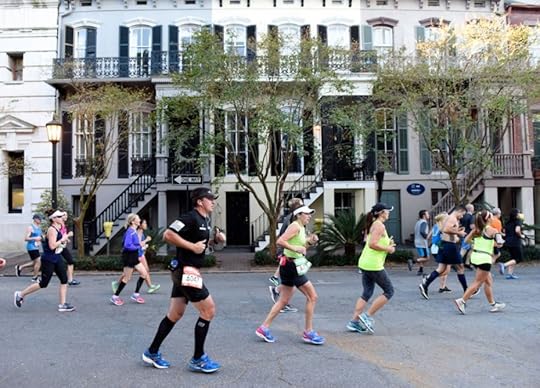
2016 Rock 'n' Roll Savannah Marathon & 1/2 Marathon
View Larger Image
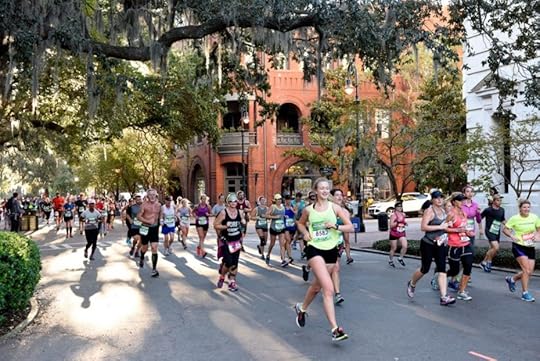
2016 Rock 'n' Roll Savannah Marathon & 1/2 Marathon
View Larger Image
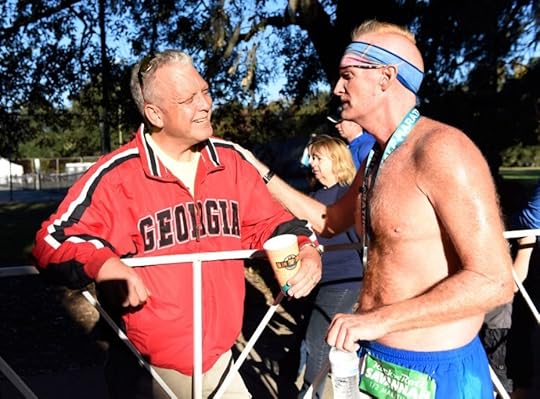
2016 Rock 'n' Roll Savannah Marathon & 1/2 Marathon
View Larger Image
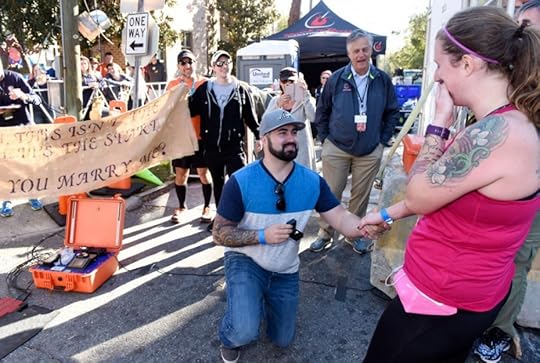
2016 Rock 'n' Roll Savannah Marathon & 1/2 Marathon
View Larger Image
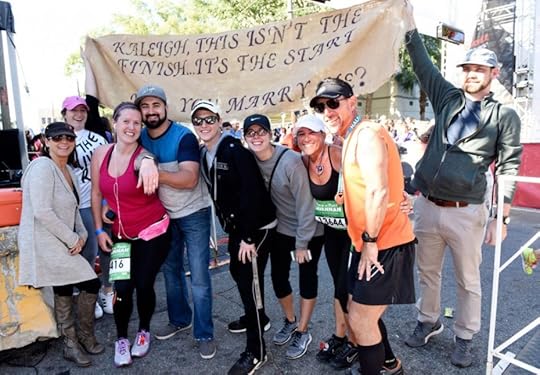
2016 Rock 'n' Roll Savannah Marathon & 1/2 Marathon
View Larger Image

2016 Rock 'n' Roll Savannah Marathon & 1/2 Marathon
View Larger Image
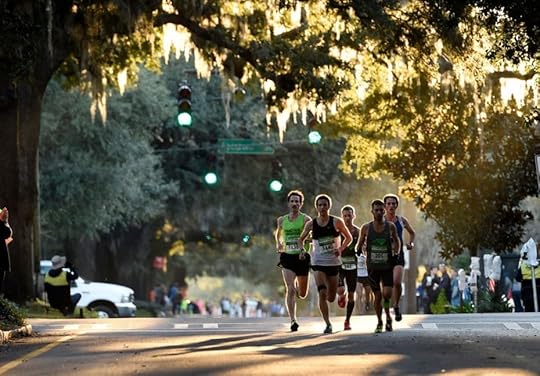
2016 Rock 'n' Roll Savannah Marathon & 1/2 Marathon
View Larger Image
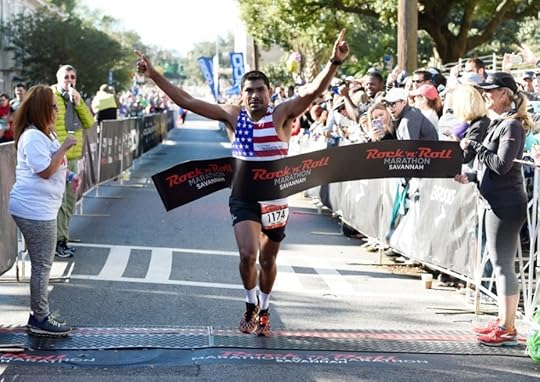
2016 Rock 'n' Roll Savannah Marathon & 1/2 Marathon
View Larger Image
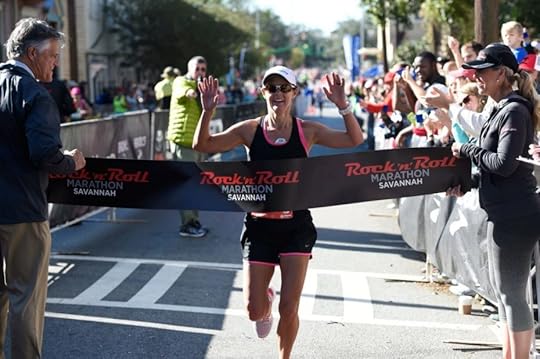
2016 Rock 'n' Roll Savannah Marathon & 1/2 Marathon
View Larger Image
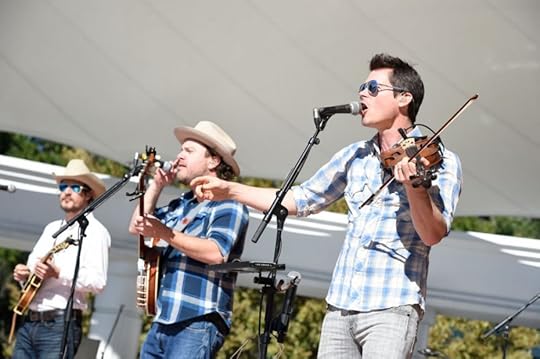
2016 Rock 'n' Roll Savannah Marathon & 1/2 Marathon
Related Galleries
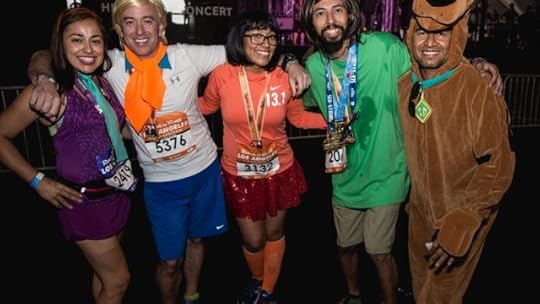
Photos: 2016 Rock ‘n’ Roll Los Angeles Half Marathon

Photos: Runners Rock Rock ‘n’ Roll Oasis Vancouver Half Marathon
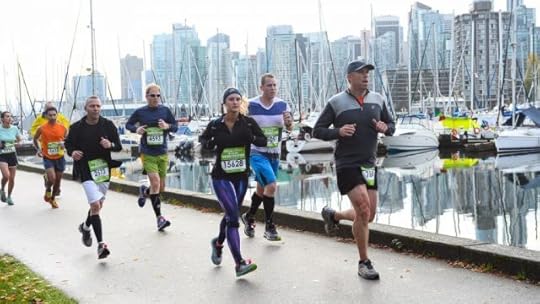
Photos: 46th Annual Cunningham Seawall 10K

Photos: Rock ‘n’ Roll St. Louis Half Marathon & 10K

More Galleries
The post Photos: Runners Rock Savannah appeared first on Competitor.com.
‘Global Citizen’ Diane Nukuri Ready to Mix it up in NYC
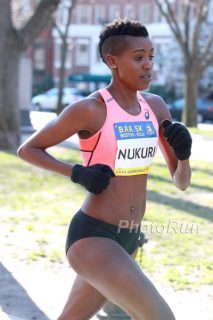
Diane Nukuri is a three-time Olympian for the East African nation of Burundi, but she's lived more than half of her life in the U.S. and Canada. Photo: PhotoRun.net
It won’t be hard to pick out Diane Nukuri in the pack of elite women at Sunday’s TCS New York City Marathon—at 6 feet tall, with her signature Grace Jones-like high-and-tight haircut, she’s one of the most distinctive runners in the field.
Less easy is categorizing where the 31-year-old Nukuri fits in the running world. Born in the East African nation of Burundi, she’s represented her country in three Olympics, and yet has lived half her life in North America, and attended college in the U.S., where she still lives and trains.
“I don’t know, do I feel American?” she said on Friday. “I race all over the world, I have friends from so many countries, I kind of feel more like a global citizen.”
RELATED: What You Need to Know About the 2016 NYC Marathon
RELATED: How to Watch the 2016 NYC Marathon
Perhaps that makes her the poster girl for this most international of marathons, although the women’s field will as usual be dominated by athletes from Kenya and Ethiopia. Still, Nukuri isn’t intimidated by them, nor the distance, although she feels it’s twice as long as her favorite race.
“I really did everything I could to get ready for this, and even though something can go wrong in the marathon and I might be disappointed, I won’t have any regrets,” she said. “I’d like to think I’m a better runner and have gotten smarter about training as I’ve gotten older.”
Much of her training for this race was done in Flagstaff with Janet Bawcom, who will join Nukuri on the starting line Sunday. Bawcom is a native of Kenya who, like Nukuri, came to the U.S. to attend college and stayed. Now 38, Bawcom became a U.S. citizen in 2010 and placed 12th in the 10,000m on the track at the 2012 Olympics running for the U.S.
“She’s like a big sister to me. I’ve learned so much from her, she’s really inspired and motivated me,” said Nukuri, citing the ability to do the first pull-ups of her life thanks to Bawcom’s prodding.
For most of her life, though, Nukuri has been self-motivated and directed, by choice and by circumstance. Selected to represent Burundi in the 2000 Olympic 5,000 at age 15, her eyes were suddenly opened to the possibilities of a world outside her life on a farm in rural Kigozi.
RELATED: Celebrities Running the 2016 New York City Marathon
The worsening civil war in her home country led her to move to Canada to live with a cousin, telling her mother she’d return in a year. She didn’t go back until she was 24, having completed college at the University of Iowa where she was All American three times.
She became a fixture on the U.S road racing scene but didn’t return to the Olympics until 2012, placing 30th in the marathon in 2:30:12. She returned to the streets of London three years later where she recorded her current PR of 2:27:50. She sandwiched her Olympic marathon with her two Big Apple runs, placing 20th in 2011 and 10th in 2013.
A third place, 32:18 showing at this spring’s NYRR New York Mini convinced her to skip the marathon in favor of running the 10,000 in Rio, where she set a national record 31:28.69, good for 13th place.
“Not running the marathon in the Olympics allowed me to come here and get treated like a princess and run in front of thousands of cheering people.”
Nukuri’s goal for Sunday is to “be competitive, place high. I think if everything goes right I can run 2:26, 2:27. But the marathon is such a long race you really don’t know what’s going to happen. So we’ll just have to see how it plays out.”
RELATED: Molly Huddle Ready for Marathon Debut in New York
The post ‘Global Citizen’ Diane Nukuri Ready to Mix it up in NYC appeared first on Competitor.com.
November 4, 2016
2009 NYC Marathon Champ Meb Keflezighi Ponders Life After Running
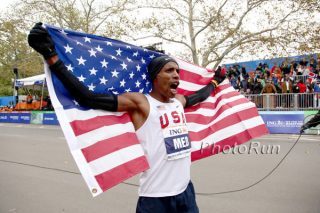
Meb Keflezighi's 2009 NYC Marathon victory still stands as the last American man to have won the race. Photo: Photorun.net
Originally published on ESPN.com on Nov. 2, 2016.
By now, Meb Keflezighi is familiar with every patch of asphalt on the New York City Marathon route.
He has run the race 10 times, finishing as high as first and as far back as 23rd. It’s a race he holds dear for his 2009 victory—coming at a time when some believed his career was over— and for the way the city has opened its arms to him, time and again. Fans have cheered his every stride through the five boroughs. He calls it “the marathon of the world” for its diverse field and crowds.
So, he’s excited to return to New York for Sunday’s race. This time, he’s even guaranteed a lead position.
For the first time since 2012, Keflezighi, 41, won’t be running. Instead, he’ll be one of the race’s grand marshals, along with his U.S. marathon teammates from this summer’s Olympics. He’ll be in the lead vehicle with a chance to see the race unfold without breaking a sweat.
“It’s going to be a whole different perspective,” he said.
These days, Keflezighi is taking some time to look at everything from a new angle. After competing in his fourth Olympics, he’s transitioning into a retirement that could take many shapes. It’s a transition that will take a while.
He plans to run two more marathons, both in 2017. That would give him 26 career marathon finishes.
“Twenty-six marathons for the distance,” he said, referring to the race’s 26.2-mile length. “And I’m also going to be 42 years old. In terms of running international, it’s 42 kilometers and 195 meters. So, 42 years old and 26 marathons in honor of the distance.”
He said nothing is official on which races he’ll run. He’s hopeful they will be Boston and New York. A finale in New York would be a fitting farewell. He made his marathon debut there in 2002.
“But we’re still working out the details,” he said.
Keflezighi will continue to train and run through next year and beyond, but he knows it’s time for his marathon career to end. After that, he’ll run half-marathons, 15Ks, 10Ks and other shorter distances, while putting most of his attention on his family, his Meb Foundation and business and charitable interests.
“I’ve been running 26 years,” he said. “I just don’t want to do competitive marathons where people, believe it or not, still expect me to win. Even though I’m 41, 42, they want me to win. But expectations, external and internal—even though I have the desire to do those things, go to Rio, get the gold—I wish it were that simple. Everything has to click. Sometimes, you just have to be thankful for the things you have earned.”
RELATED: How to Watch the 2016 NYC Marathon
‘No unturned stones’
What Keflezighi has earned has been remarkable.
He’s the only marathoner to have won an Olympic medal (silver in 2004) while also winning at Boston and New York. He was on the 2000, 2004, 2012 and 2016 U.S. Olympic teams. He won 23 national championships at various distances. And he won four NCAA titles at UCLA before turning pro in 1998.
“My career has been more special than I could have ever imagined,” he said. “I’m grateful for that.”
He said “there’s no unturned stones” in his marathon career. He has accomplished more than he dreamed. His only goal for his final two marathons will be to finish in the top 10. They won’t be ceremonial strolls.
“I don’t want to say, ‘Ahh, I just finished it,'” he said. “I want to finish strong and be as competitive as I can be.”
Keflezighi, who came to the United States with his family from war-torn Eritrea at the age of 12, discovered running as a middle schooler in San Diego. He then became a standout at San Diego High School and earned a scholarship to UCLA. He excelled at cross country and the 5,000 and 10,000 meters. He made his first Olympic team in the 10,000 and competed in the 2000 Sydney Summer Games. The following year, he set a U.S. 10K record (27:13.98).
It wasn’t until 2002 that he ran his first marathon, finishing New York in 2:12:35, good for ninth place.
At the time, he said he never wanted to do a marathon again—yet he actually had found his calling. Now he laughs when sharing his only regret: “What I now know, I wish I knew then.”
RELATED: Why NYC Marathon Fixture Dave Obelkevich, 73, Won’t Stop Running
What’s next?
Keflezighi’s whole focus earlier this year was on making the Rio de Janeiro Olympics and doing as well as possible. He qualified by finishing second in the U.S. trials in Los Angeles in February, running 2:12:20. At 40, he became the oldest American marathoner to qualify for the summer games.
He went into the Olympics feeling strong, but he got sick on race day and had to stop several times to throw up. He willed himself to continue. Then, as he approached the finish, he slipped on the wet pavement and fell face down across the line—where he promptly did three pushups to show he was fine, got up and celebrated his 33rd-place finish in 2:16:46.
Though disappointed, he’s proud of what he did in Brazil. One reason he wanted to go to a fourth Olympics was so his three daughters (ages 10, 8 and 6) would have a memory of their father in the Rio Games.
They were there at the finish with wife Yordanos, brother Hawi and longtime coach Bob Larsen.
“They remember it,” Keflezighi said. “That was the whole goal. My youngest daughter does remember. When she was asked what was the best part of the summer, she said, ‘When Daddy competed in Rio.'”
Time with his wife and daughters is at the top of Keflezighi’s wish list now, as he transitions into retirement. He said travel and training have taken too much time from them.
He hopes to blend family time with the work he does for the Meb Foundation, which is focused on helping children to be healthy and successful. Also on that list is doing public speaking and coaching. He’s interested in coaching every type of athlete, from collegiate standouts to men and women who simply want to complete in a half marathon.
Keflezighi said he doesn’t want to be known as just a fine runner but also as a “positive citizen and contributor to society.”
And Keflezighi’s post-marathon world will also be filled with appearances and work for his many sponsors. Last weekend, he was at a half marathon in Sonoma, California, mingling with runners for a company that makes jerky products. Included among his other sponsors are companies that make shoes, printers, nutrition bars, compression socks, sunglasses and tires.
Though he won’t be running in Sunday’s New York City Marathon, he’s still having a busy race week. On Tuesday, he received an award from famed distance runner Grete Waitz’s AKTIV Against Cancer organization for his philanthropic work, and he took part in a news conference with the grand marshals on Thursday.
Twenty-four marathons down, two to go. There’s still more work to do.
“It is my plan,” said Keflezighi, laughing, “but sometimes you wonder why you come up with these things.”
RELATED: Fun Facts About NYC Marathon Runners
The post 2009 NYC Marathon Champ Meb Keflezighi Ponders Life After Running appeared first on Competitor.com.
Why NYC Marathon Fixture Dave Obelkevich, 73, Won’t Stop Running
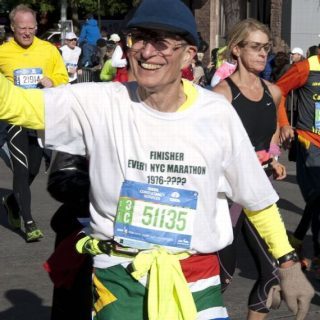
Obelkevich, seen here during the 2014 NYC Marathon, is easy to spot on the course with his South African flag shorts and T-shirt that calls attention to his streak. Photo: Sally Stilwell
Originally published on ESPN.com on Nov. 1, 2016.
On Sunday morning, Dave Obelkevich will pull on a white T-shirt that declares he has finished every New York City Marathon since 1976 and slip into his bright South African flag shorts.
He’ll pin some business cards to the inside of his hat, make certain his entry number is affixed to his shirt and head out the door of his Upper West Side apartment to make his way to Staten Island where the race starts.
“It’s his favorite party of the year,” says his wife, Lin Dominguez. “He wouldn’t miss it.”
Even among some 50,000 starters, Obelkevich will stand out from the crowd. The yellow, green, red, white and blue shorts help, of course, but it’s more than that.
At 73, he’s a running, smiling, storytelling link to the days when the NYC Marathon consisted of four-plus loops through Central Park, fewer than 260 finishers and a smattering of spectators.
Obelkevich, a trim 5-foot-8, 145-pound retired high school music teacher, has been finishing NYC Marathons since before defending champions Stanley Biwott and Mary Keitany were born.
Obelkevich completed his first in 1974. He had to drop out of the 1975 race but has finished every one held since. (Hurricane Sandy wiped out the 2012 race.) The soon-to-be-40-year streak is the longest in the history of the event, which began in 1970.
For years, Obelkevich didn’t realize he had a streak. The annual 26.2-mile race was just something he did with many of his friends from the Millrose Athletic Association.
“I didn’t even think of not doing it,” he says. “You know, you tie your shoes in the morning, you brush your teeth and you do the marathon.”
Plus, his hometown marathon was just one of many events he ran each year. He has raced in 65 other marathons and more than 200 ultramarathons around the globe.
Now he says the streak is something special, to be savored and continued for as long as possible. It’s an annual celebration of his beloved sport and city. It’s also another opportunity to make friends.
As he runs through the city’s five boroughs, he strikes up conversations with those running alongside him. Often he’ll reach up, pull a card from his hat and hand it to his new friend so they can stay in touch.
“Many years ago I heard about a high school track coach,” Obelkevich says. “He told his boys, ‘I don’t care if you come back from a meet and tell me you won every race you were in. If you didn’t make at least two new friends, consider yourself a failure.’ I’d never heard that before, but I think there’s a lot of truth in that.”
RELATED: How to Watch the 2016 NYC Marathon
Starting with one loop
Obelkevich first ran in the NYC Marathon in 1973. He didn’t officially enter but decided to go to Central Park to jump in. He figured if the runners could do four-plus loops of the park, he could do one.
“So I waited until I thought I could keep up with the runners, and I ran one loop of the park, which is 6 miles,” he says. “It took like 43 minutes. Then I went home.”
In 1974 he entered for the first time and finished in 4 hours, 20 minutes. That year, about half the runners dropped out because of the weather on a hot and rainy September day.
“I was just very stubborn,” he says.
He surprised himself by finishing, because he didn’t know how to train.
“I ran 6 miles a week,” he says, laughing. “I ran every Sunday.”
In 1975, the last time the event was contained to Central Park, Obelkevich began feeling dizzy late in the race. He lay down to rest and got back up three times. When he had to stop a fourth time with just 3 miles to go, friend and race director Fred Lebow drove by.
“I said, ‘Hey, Fred, give me a ride,'” Obelkevich recalls. “He should have said, ‘Hell no, Dave!’ But he said, ‘Get in.’ So I could have walked those last 3 miles and had 41 finishes in a row.”
In 1976, the course expanded through the city’s five boroughs. Obelkevich recalls running through parts of the city that he had never seen, although he had lived in the city since 1961. Staten Island, the Verrazano-Narrows Bridge and parts of the Bronx, Brooklyn and Queens and even the east side of Manhattan were new to him. At one point, he recalls the runners being directed to a path along the river.
“You would see three or four people per mile,” he says. “Most of them were drunks wondering, ‘What the hell is going on?'”
Eventually, his training intensified. He did as many as 60 miles a week, mostly in Central Park near his home. Now he does 30 to 40 miles per week.
In 1982 he ran 2 hours, 40 minutes, his fastest time in New York. These days he just hopes to beat five hours. Last year he came in at 4:57.
That ’82 race is one of his favorite memories, partly because of his personal record, but also because he ran the first half with friend Leslie Watson, a top Scottish distance runner. He decided to run with Watson early because she usually paced herself and then came on strong over the second half.
“At the half-marathon, we were an hour, 21 [minutes], and she took her gloves off, and I said, ‘You’re coming to my party, aren’t you?’ She said yes, so I said, ‘Well, let me carry your gloves. I’ll give them back to you when you come to the party.’ So I took her gloves, took off and did 1:19:34 for the second half.”
The only time the streak almost died had nothing to do with Obelkevich’s endurance. Once in the early 1990s he received a letter saying his application had been denied. His wife suggested he write to Lebow to get it cleared up, but he never got around to it. Eventually she wrote to Lebow on his behalf, and Obelkevich was able to get to the starting line.
“If it weren’t for her, my streak would have been over,” he says.
RELATED: Fun Facts About NYC Marathon Runners
Forever young
Obelkevich retired from teaching 15 years ago but says he’s never bored.
He plays violin or viola in string quartets and orchestras and enjoys bird watching and traveling with his wife. He also cycles—back in 1995 he pedaled across the U.S.—and runs. As much as he likes marathons, he likes longer races even better.
“That’s where the most fun is,” he says.
One of his favorites is the Comrades Marathon in South Africa, a 56-mile trek that dates to 1921. It was after doing his first Comrades in 2002 that he started to wear the South African flag shorts. He has finished Comrades 11 times.
He has several pairs of the shorts and wears them for all his training runs and races. He says they spark interesting conversations with other runners, usually starting with, “Hey, are you from South Africa?”
Dominguez says of her husband’s training runs: “It’s very rare that he comes back without having met someone new, and often someone from another country visiting New York. He’s always having fun meeting people.”
His race-day shirt is also a conversation starter. Designed by a friend, on the front the shirt reads: “Finisher every NYC Marathon 1976-????” On the back is a speed-limit-type sign that reads: “No Age Limit.”
“I would say 15 or 20 people during the marathon will say, ‘Do you really have such a long streak?'” he says.
Michael Capiraso, president and CEO of New York Road Runners, the group that organizes the race, says Obelkevich is a well-known figure among New York runners who is “inspiring to all generations of runners.” He says Obelkevich is one of more than 1,000 runners who have completed at least 15 NYC Marathons.
Two runners, David Laurance and Richard Shaver, are tied for the second-longest streak with 38 consecutive finishes.
Connie Lyke-Brown, who turns 73 the day before this year’s race, has the longest women’s streak at 37 races. She runs year-round but ramps up her training in July so she’s ready for New York, the only marathon she still runs. She had a personal best of 3:34 in the ’80s but now finishes in about 5½ hours.
“I’m at a point now that time isn’t that important to me,” says Lyke-Brown, a realtor in Sarasota, Florida. “Finishing and feeling good and having a great time is what’s important.”
As Obelkevich heads toward completing his 40th consecutive race and 41st overall, he says the race has changed in three significant ways from its early days.
First, he has seen the crowds grow from just a few spectators to more than 2 million.
Second, the participation of women has skyrocketed. Just one woman started the first race, and there were very few over the first few years. In 2015, there were 20,703 female finishers, the most in race history. Women represented 42 percent of all finishers.
Third, the race has become an international magnet. Runners from 125 countries were in last year’s race. Over the past 10 races, 52 percent of runners have been from other countries.
Obelkevich loves the international flavor.
“You can go to any other major [U.S.] marathon and you won’t see one out of 10,” he says of the foreign contingent. “The leaders may be from other countries, but the others — the three-hour, four-hour, five-hour marathoners — you don’t find them in other marathons. That’s very exciting to me.”
Obelkevich wants to keep his streak going as long as possible. Running keeps him fit and energized.
“We joke that if you see someone over 60 and they look old, they’re probably not a runner,” he says. “Or maybe they were and their knees hurt and they don’t run anymore. Yeah, running keeps everybody young.”
RELATED: 2009 NYC Marathon Champ Meb Keflezighi Ponders Life After Running
The post Why NYC Marathon Fixture Dave Obelkevich, 73, Won’t Stop Running appeared first on Competitor.com.
What You Need to Know about the 2016 NYC Marathon
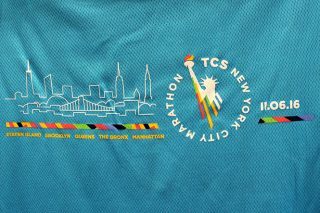 Basic Details
Basic DetailsThe 46th running of the New York City Marathon will be held on Sunday, Nov. 6. It has been held every year since 1970, except for 2012—when it was canceled because of Hurricane Sandy. This marks the 40th anniversary of the five-borough course that starts in Staten Island and ends in Central Park. The racing begins at 8:30 a.m. EST with the pro wheelchair competitors. The pro women will start at 9:20 a.m. followed by the pro men and wave 1 of the rest of the field.
RELATED: 45 Reasons We Love the New York City Marathon
How to Watch the Race
On TV
From 9 a.m. to 12 p.m. ET on Sunday, Nov. 6, live coverage of the race will be broadcasted on ESPN2 and via WatchESPN for those who have video subscriptions from affiliated providers. ESPN commentators John Anderson and Sage Steele will serve as lead announcers with support from 13 nationally and locally recognized commentators, reporters, and analysts. Spectators can also watch pre-race and continuing coverage of the race on ESPN3 from 7 a.m. to 9 a.m. and 12:30 p.m. to 2 p.m. ET, as well as a view of the finish line from 9:30 a.m. to 5 p.m. ET.
For those living in the New York tri-state area, tune into local WABC-TV, Channel 7 from 9 a.m. to 2 p.m. ET to catch the live race broadcast. Live pre-race coverage will start from 7 a.m. ET, and on Friday, Nov. 4, from 5:30 to 6:30 p.m. ET, and Saturday, Nov. 5, from 7:30 to 8 p.m. ET, WABC-TV will also feature special coverage of additional race-weekend events.
On Mobile Devices
No TV? No problem. Download either the WatchABC (for New York residents) or WatchESPN (for national audiences) through the App Store or Google Play Store for Free, and be able to catch all the action on your laptop, smartphone and/or tablet.
On Twitter
We’ll be live-tweeting from the race on @runcompetitor. Follow us for the latest race day updates.
In Person
Our on-the-course spectator’s guide to watching the NYC Marathon will help you find the best places along the course to view the race that even the locals may not know about.
RELATED: I’m a Competitor—ESPN Anchor John Anderson
How to Track Runners
Know someone (or maybe several people) running this year’s NYC Marathon? You can track up to 20 runners, and stay up to date on the latest race-week and race-day events, by downloading the 2016 TCS New York City Marathon mobile app. Or use Live Results through the NYRR site to track up to 15 runners on race day.
The Course
The New York City Marathon is held on a point-to-point course that sends runners through all five of the city’s boroughs. It starts in Staten Island, then sends runners through Brooklyn and Queens before entering Manhattan briefly and then looping through a portion of the Bronx. The final 5 miles of the course are back in Manhattan, mostly winding through Central Park to the finish line. The New York Road Runners have a great map of the course and also an animated video of the course.
RELATED: A Glimpse Inside the NYC Marathon Course in 26 Pictures
Elite Races
Men
American Dathan Ritzenhein is expected to be one of the top contenders in the men’s elite field of Sunday’s race, which isn’t quite as deep as it has been in recent years but still has the likes of Kenya’s Stanley Biwott (2:03:51) and Ethiopian Lelisa Desisa (2:04:45). Other top Americans include Abdi Abdirahman (2:08:56), Ryan Vail (2:10:57), Matt Llano (2:12:28), Tyler Pennel (2:13:32) and Craig Leon (2:13:52).
MORE: Ritzenhein Seeking Podium Finish in New York
Women
There are several compelling stories in the women’s elite races, but probably the best is the marathon debut of Molly Huddle. The the American record holder of the 10,000 meters on the track has been the most dominant U.S. road runner in recent years from 5K to the half marathon. She’ll have plenty of fast international runners to contend with, including two-time defending champion Mary Keitany of Kenya (2:18:37) and Aselefech Mergia of Ethiopia (2:19:31). Other top Americans include Annie Bersagel (2:28:29), Janet Bawcom (2:29:24), Sarah Hall (2:30:06), Esther Atkins (2:33:15), Neely Gracey (2:35:00) and Kim Conley (debut).
MORE: Molly Huddle Ready for Marathon Debut in New York
RELATED: Sara Hall Ready to Race Through New York City
RELATED: Olympic Triathlon Champ Gwen Jorgensen Eager to Run NYC Marathon
Celebs, Expo, Shoes and Other Stuff
Past American Idol contestant, Jax, will be one of the many celebrities running the New York City Marathon for charity. Her music career seemed to be taking off, but then she was diagnosed with thyroid cancer. The 20-year-old New Yorker is using running to overcome it and keep her on a healthy track.
RELATED: Celebrities Running the 2016 New York City Marathon
RELATED: 2016 NYC Marathon Special-Edition Running Shoes
RELATED: Scenes from the 2016 NYC Marathon Expo
RELATED: Fun Facts About NYC Marathon Runners
RELATED: How to Run the NYC Marathon While Drinking Beer
The post What You Need to Know about the 2016 NYC Marathon appeared first on Competitor.com.
Scenes From the 2016 New York City Marathon Race Expo
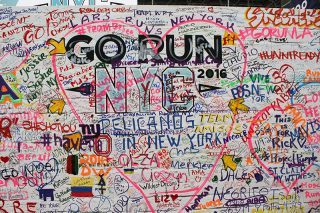
Want to get stoked about running the New York City Marathon or at least feel the energy of those who are running it on Sunday? Check out these scenes from the 2016 New York City Marathon Health and Wellness Expo at the Jacob K. Javits Convention Center.
RELATED: 2016 NYC Marathon Special-Edition Running Shoes
RELATED: Fun Facts About NYC Marathon Runners
Photo Gallery
1 of {count}
Back to Start
View Larger Image

View Larger Image
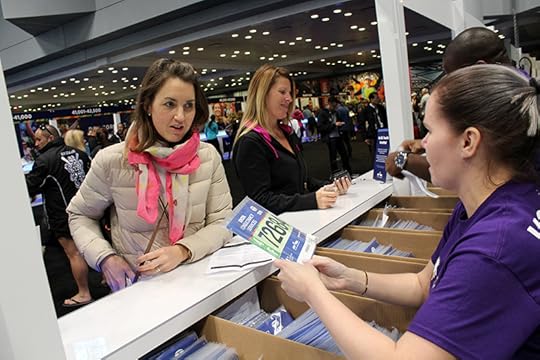
View Larger Image

View Larger Image

View Larger Image
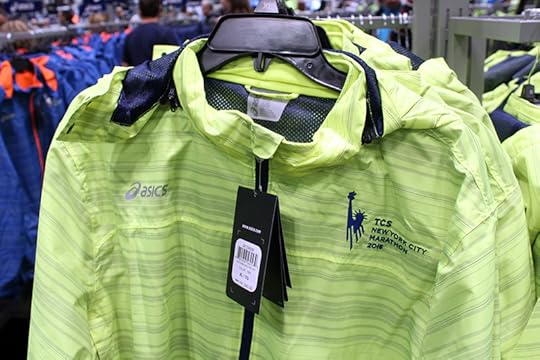
View Larger Image
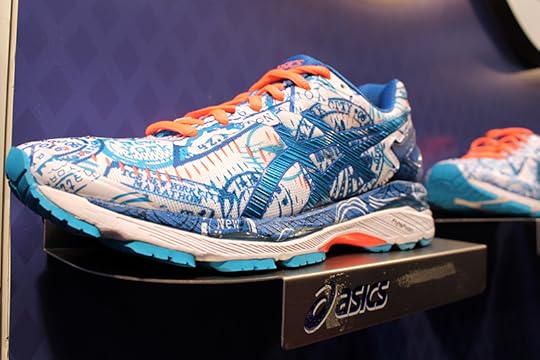
View Larger Image
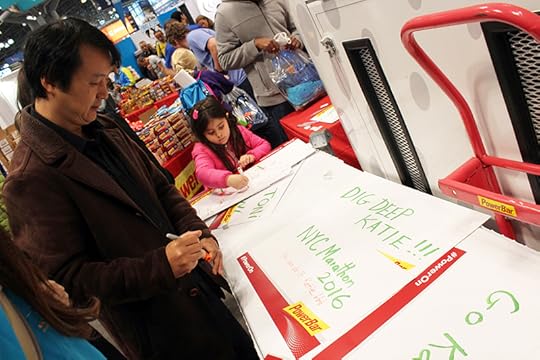
View Larger Image
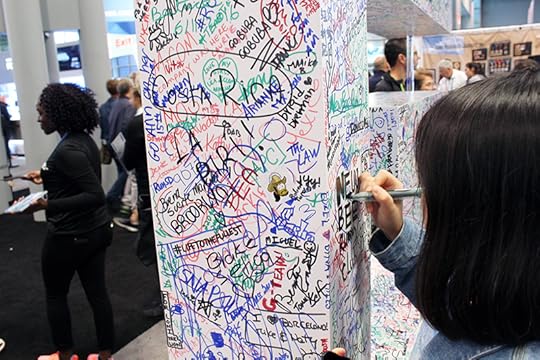
View Larger Image
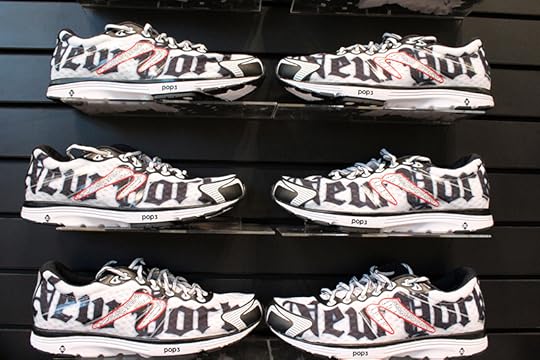
View Larger Image
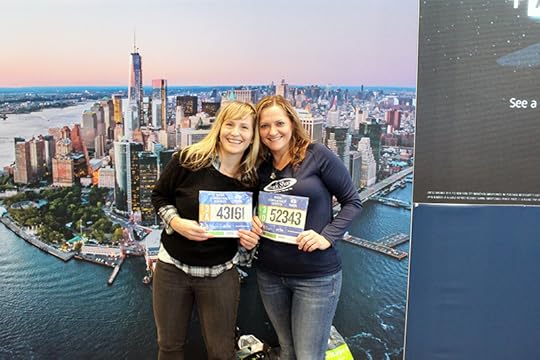
View Larger Image
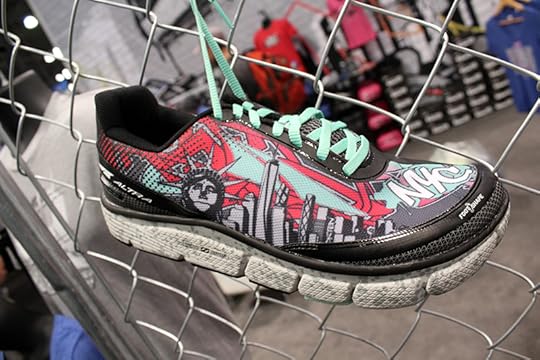
View Larger Image
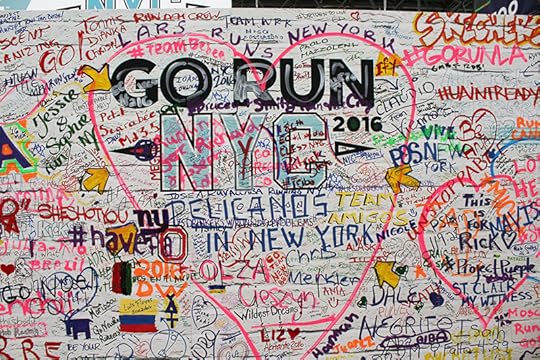
View Larger Image
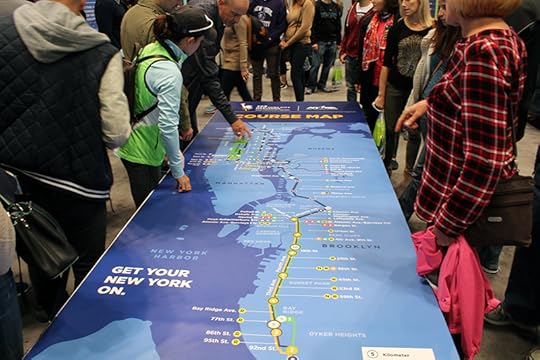
View Larger Image
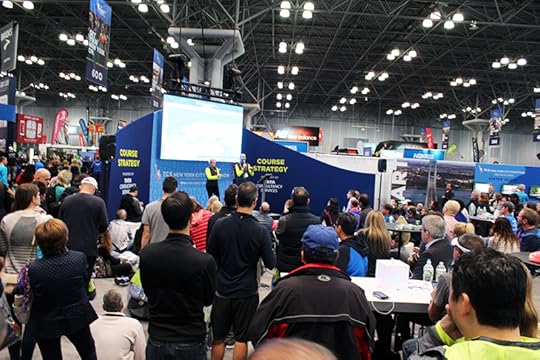
View Larger Image
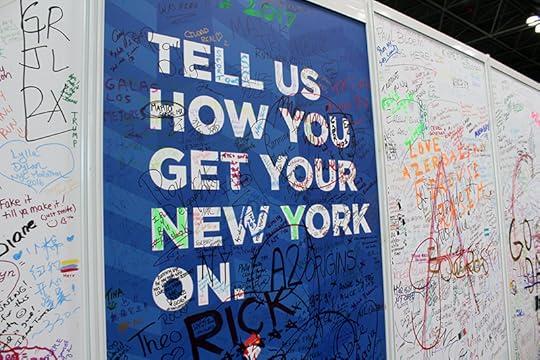
View Larger Image
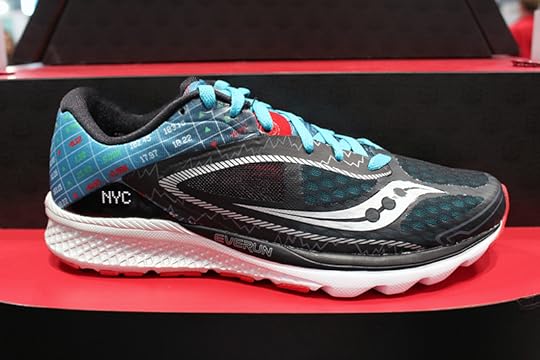
View Larger Image
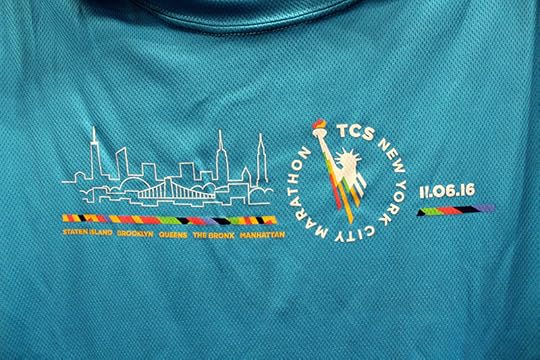

More Galleries
The post Scenes From the 2016 New York City Marathon Race Expo appeared first on Competitor.com.
Sara Hall Ready to Race Through New York
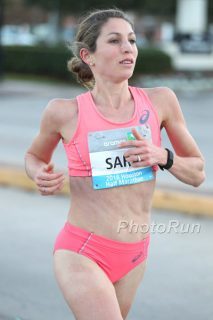
Sara Hall is hoping to improve upon her 2:30:06 marathon PR on Sunday in New York. Photo: PhotoRun.net
Now that husband Ryan has retired from competitive running, Sara Hall has assumed the mantle of the family competitive marathoner.
While she has yet to enjoy the same sort of success as Ryan, Sara hopes that will change Sunday when she tackles the 26.2-mile distance for the fourth time through the five boroughs of New York City. The 33-year-old has improved in her past two marathons—2:31:14 at the 2015 Chicago Marathon and 2:30:06 at the London Marathon back in April—but those results might have been even better if she had more runners to race.
“My other marathons have pretty much been just hang-on, survival type affairs,” she said. “So I’m looking forward to having a good group of girls to run with. I’ve always been better at racing than time-trialing, and that’s something that’s been missing in my other marathons.”
Hall is also looking forward to New York’s more challenging, undulating course.
“I like cross country and have always done well at it, and other runners have told me New York favors those type of runners,” she said. “So I really embraced the hills in my training for this one.”
RELATED: How to Watch the 2016 New York City Marathon
Knowing that the New York course features some significant climbing, including the bridges and the final miles in Central Park, Hall incorporated more hills into her training, but also cut back on the total volume.
“This race comes at the end of a long year of training and racing, so I think I’ve built up a pretty good fitness background,” she said. “I was focused more on hitting my key workouts than on the overall mileage, just my go-to bread and butter workouts like 16-mile tempos and 23-mile long runs, so I could gauge my fitness. I knew I’d be emotionally and psychologically excited for New York, I was just hoping my body would feel the same, just have some wheels under me, and I’m pleased it has, I’ve got gas in the tank.”
RELATED: Celebrities Running the 2016 New York City Marathon
Hall has also had to schedule her training around the demands of motherhood, as she and Ryan have their hands full with the four Ethiopian daughters they adopted last year.
“I think you kind of realize you’re not going to run as fast as you possibly could if you didn’t have to worry about making meals and homework and things like that. But fortunately I’m still running faster than I ever have, just maybe not as fast as I might if I was just focused full time on running,” Sara explained. “But you realize that when you make the choice to be a parent, that it’s a selfless thing. I’m enjoying professional running more than I ever have in my career, still PRing, so that’s been a pleasant surprise. And now that Ryan’s retired, he can pitch in a lot more with the girls if I have to do a workout.”
Ryan, who is Sara’s coach, only raced the five-borough NYC Marathon course once, finishing fourth in 2009 (he won the U.S. Olympic Trials race on a different criterium course in Central Park in 2007), so he hasn’t been a huge source of advice for Sara’s debut here.
RELATED: Molly Huddle Ready for Marathon Debut in New York
“To be honest, I don’t remember that much about the course,” Ryan said. “And I wasn’t having that great a day, so I don’t want Sara’s expectations of the race to be colored by my experience then.”
One thing he did tell her was to focus on staying present in the race, not to be discouraged if the leaders start to pull away.
“I think Ryan was something like 15th on First Avenue, and he picked off about a dozen people who fell apart over the last 6 miles,” she said.
RELATED: Fun Facts About NYC Marathon Runners
That strategy plays to Hall’s strength of racing, rather than pacing, her run on Sunday.
“Ryan told me that in New York you can feel like you’re putting out more effort than your times show, so not to be discouraged if I see some slow splits, and just focus on competing,” Sara said. “I was also running in Mammoth last week with Deena Kastor, and one piece of advice she gave me that’s stuck is that the hills come at a tough time in the race, so you’ve got to have a reason to embrace that pain, and have it before you get there. So I’m going to try to keep that in mind for Sunday.”
RELATED: Olympic Triathlon Champ Gwen Jorgensen Eager to Run NYC Marathon
The post Sara Hall Ready to Race Through New York appeared first on Competitor.com.
Ryan Hall's Blog
- Ryan Hall's profile
- 21 followers



